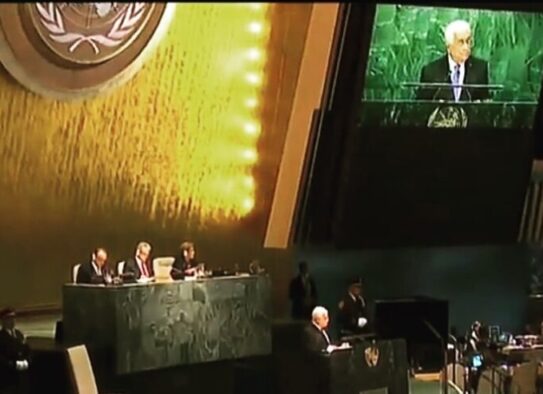
Commentary on Swedish Radio following Abbas’s speech:
“Palestinas flagga hissas och Abbas tal i FN” Intervju i P3 Nyheter, 1 oktober 2015.
After weeks of rumours of ‘dropping a bombshell’ in his UN speech, Abbas addressed the General Assembly on 30 September. As it showed, at the day of delivery, the promised ‘bomb’ had transformed into a mere warning shot.
In brief, the speech included two key points:
1) Palestine is a state under occupation
2) The PLO can no longer be bound by previous agreements with Israel
The first point, however, was practically to kick in an open door, at least from an international law perspective. The applicability of international law in situations of occupation is based on factual determination and not on declarations by the parties/disputants. The Hague Convention IV of 1907, which still holds true, stipulates that the triggering requisite of ‘occupation’ is when ‘territory … is actually placed under the authority of the hostile army.’ It is not refuted by anyone that parts of the West Bank and East Jerusalem are currently under Israeli (military) administration is not refuted – not even by Israel itself.
The second point remains relatively unclear, as Abbas did not specifically mention which agreements he was referring to. The Oslo I Accords, for instance, include Israel’s and the PLO’s mutual recognitions of each other. They also include the establishment of the Palestinian National Authority, not to mention the presidential post Abbas is holding himself. It was not clearly stated whether these also were under consideration to be cancelled. If, which is most likely, Abbas remarks were only meant as a threat to end security/economic cooperation with Israel, leading to (further) chaos in the Palestinian territories, no precise deadline when this would happen was mentioned. This lack of time frame very much weakened Abbas attempt (if this was the case) to frighten Israel, as well as the international community. Until a clear deadline is set (and kept), Abbas’s threats will remain empy.
Meanwhile, Abbas finds himself squeezed between; on the one side, a very disillusioned and disatisfied Palestinian public; and, on the other side, an Israeli political leadership with seemingly very little interest in negotiating a solution to the conflict. In addition to this, which also weighs heavily on Abbas, internal tensions in Fatah are building up as party members now are preparing for his succession.

